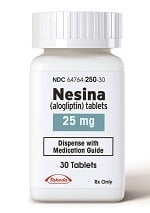As if last week's Jardiance news wasn't enough to worry makers of DPP-4 diabetes drugs, the FDA has now issued a warning that the class of meds might cause "severe and disabling" joint pain.
The agency's drug safety team searched the FDA Adverse Event Reporting System database and medical journals, and turned up cases of severe joint pain in patients using the DPP-4 inhibitors to keep their blood sugar under control. The symptoms sometimes cropped up immediately, but other times surfaced years after a patient started taking one of the drugs, the FDA said in a new drug safety communication.
After discontinuing the drugs, the patients' symptoms stopped, usually in less than a month. Some patients saw the pain return after restarting the same product, or switching to another DPP-4 drug.
The FDA added the joint-pain warning to the official labeling on the entire DPP-4 class. The biggest-selling DPP-4 meds are Merck & Co.'s ($MRK) Januvia products, which include one single-agent pill, Januvia (sitagliptin) and two Januvia-plus-metformin products sold under the Janumet brand.
 The class also includes AstraZeneca's ($AZN) Onglyza (saxagliptin) and its metformin combo Kombiglyze; Eli Lilly ($LLY) and Boehringer Ingelheim's Tradjenta (linagliptin) and related combos Glyxambi and Jentadueto; and the newest entry, Takeda's Nesina (alogliptin), and two combo pills, Kazano and Oseni.
The class also includes AstraZeneca's ($AZN) Onglyza (saxagliptin) and its metformin combo Kombiglyze; Eli Lilly ($LLY) and Boehringer Ingelheim's Tradjenta (linagliptin) and related combos Glyxambi and Jentadueto; and the newest entry, Takeda's Nesina (alogliptin), and two combo pills, Kazano and Oseni.
Of the 33 cases of severe joint pain FDA reports, 28 cropped up in Januvia and Janumet patients, the agency said, with Onglyza accounting for 5, Tradjenta for two and Nesina for one. Some patients took more than one DPP-4 drug, so the individual drug tallies don't match the case total. Januvia and Janumet's dominance in the category could account for the fact that the majority of joint-pain cases were flagged in Januvia and Janumet patients.
This isn't the first time the FDA has added warnings to DPP-4 meds; the entire class already bears cautionary language about the risk of pancreatitis and allergic reactions, as well as hypoglycemia when used in combination with other diabetes meds.
The new risk information also comes on the heels with another challenge for DPP-4 drugs. Earlier this month, Lilly and Boehringer reported data from a cardiovascular safety trial starring its SGLT2 drug Jardiance. Type 2 patients using the drug saw fewer heart attacks, strokes and CV death than the control patients did, a finding that could sway doctors and patients toward Jardiance in particular and SGLT2 drugs in general.
"DPP4s are generally well tolerated, neutral on weight and have for the most part been viewed as safe," Evercore ISI analyst Mark Schoenebaum said in note to investors earlier this month. "However, DPP4 inhibitors have failed to demonstrate a CV outcomes benefit. After today, given the CV benefit from at least on SGLT2 inhibitor Jardiance, we expect doctors will be more eager to prescribe SGLT-2s in front of DPP4s."
Merck's Januvia franchise may be the best-placed DPP-4 on the CV side, however. Earlier this year, the company rolled out the results of the TECOS trial, a long-awaited heart safety study that showed Merck's drug presented no additional heart failure risk. That compares with fellow DPP-4 meds whose safety data suggested additional hospitalizations from heart failure in those patients. At the time, analysts figured the TECOS data could boost Januvia/Janumet sales by as much as 10% by 2020, or up to $7.3 billion.
- see the FDA safety communication (PDF)
Special Reports: Top 10 best-selling diabetes drugs of 2013 | Top 15 pharma companies by 2014 revenue - Merck - AstraZeneca - Eli Lilly